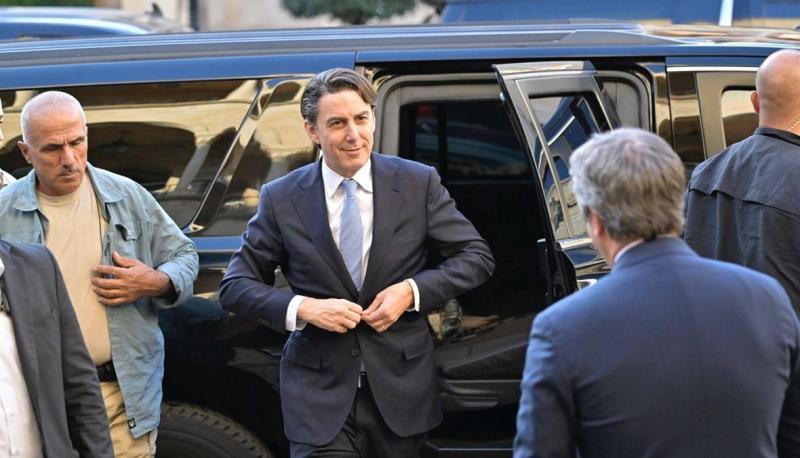Most media and political circles have been busy anticipating and following news about the meeting between the U.S. presidential envoy, Amos Hochstein, and the French presidential envoy, Jean-Yves Le Drian, in the French capital, Paris. There is hope for new information regarding a movement, initiative, or specific effort concerning Lebanon's disastrous situation, particularly the ongoing presidential vacuum, alongside the persistent "war of distractions" in the south, which could escalate at any moment, paralleling the fierce war in Gaza since October 7.
In reality, waiting for positive news from Paris as a result of the meeting between the two envoys is akin to waiting for a mirage in the desert. The meeting of Hochstein and Le Drian resembles a gathering of representatives of an unannounced bankruptcy, producing nothing but illusions, general statements, good intentions, and repeated positive hopes.
Amos Hochstein, envoy and representative of U.S. President Joe Biden, who is approaching an uncertain re-election campaign, does not even have a guarantee that he will run in it, nor that his party, the Democratic Party, will keep him as a candidate against the Republican nominee, Donald Trump, especially after the disastrous outcomes of the recent presidential debate that exposed Biden's failures against the erratic and blundering former President Trump.
Currently, Hochstein is an envoy for a president whose candidacy for the race remains uncertain; if he stays in the race, his chances against an advancing opponent are not assured. The same situation applies to Jean-Yves Le Drian, the veteran French diplomat representing the French president. It remains unclear what will happen to him after the second electoral round, following the first election round which elevated the far-right's position in France for the first time in modern history.
The meeting between Hochstein and Le Drian has no profound or effective impact, but rather perpetuates hopes and promises for a desperate and hopeless country. It perfectly resembles the common saying: "The incompetent came to the inept one." Neither Hochstein, the "competent," has any remedy following the farce and ridicule involving his lost president, nor can Le Drian, the "inept," secure any help in light of France's shock, particularly after the rise of the far-right in the first electoral round.
As for the current situation in the United States, no one has any answers regarding it. What will be Biden's fate and that of the Democratic Party? What will happen if the erratic Trump reaches the White House?
Similarly, regarding France's political, economic, social, and financial situation, there are also no clear answers. The most positive scenarios speak of open crises amidst severe competition and turmoil in France following the elections, where no team would be capable of ruling and making decisive choices similar to Lebanon's situation after its recent elections, where a majority was lost in the current parliament among fragmented groups of deputies scattered here and there.
In this context, the main narrative dominating the conversation now, and for a considerable time, is the situation in Gaza: will an agreement and ceasefire be reached or not? Given that Hezbollah and Iran link all developments to the ongoing war in Gaza, it is natural that no solutions will move or succeed in Lebanon while the war in Gaza is ablaze, especially with the existence of a fragmented opposition scattered between Maarab, the Sioufi, and Merna al-Chalouhi.
The scenarios among observers and stakeholders indicate that Iran, which controls the armed resistance networks in the region, is awaiting the outcomes of its presidential elections to determine who the next president will be, what their main and actual orientations will be, and how they will deal with key issues. All of this is occurring amidst discussions that U.S.-Iranian negotiations, previously held in the Omani capital, Muscat, may continue after the political landscape in Tehran becomes clear. Some believe that Iran, formerly engaged in discussions with the U.S., will not settle any issues until the outcome of the U.S. presidential elections is clearer.
The difficulty of Lebanon's predicament is that it has become a hostage in the hands of its captors from regional and international powers and local proxies. These entangled forces are currently involved in multiple negotiations and disputes, continuing to develop and complicate matters. Lebanon's fate, along with its presidency and state stability, is now tied to the wills of those who hold the gun, cannon, missile, bomb, and pistol, rather than being in the hands of its suffering, tortured, and powerless people.




